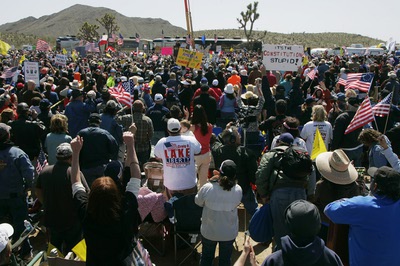
A colonial fife and drum corps weaves through the crowd before Saturday’s “Showdown in Searchlight,” a rally organized by the Tea Party Express.
Sunday, March 28, 2010 | 2 a.m.
Tea Party: "Showdown in Searchlight"
The Tea Party Express buses kicked off their latest national road trip Saturday with a rally in Sen. Harry Reid's hometown of Searchlight, Nev., which only has a population of 700. Sarah Palin gave the keynote address to the thousands who showed up for the "Showdown in Searchlight."
Jon Ralston on Showdown in Searchlight
Jon Ralston discusses the Showdown in Searchlight on KVBC News.
YouTube: Sarah Palin in Searchlight
Related stories
- Excerpt from Sarah Palin’s address (3-28-2010)
- Many Tea Party attendees felt compelled to rally (3-28-2010)
- Sarah Palin rallies thousands in Harry Reid’s hometown (3-27-2010)
- Ann Coulter rails against government intervention in health care (3-27-2010)
- With Tea Party in town, Harry Reid helps open shooting park (3-27-2010)
Sun Coverage
The Tea Party activists are committed.
They endured traffic and a cold, stinging wind that whipped up a sheen of dust and pollen.
They traveled from as far as Washington state and Wyoming to a desolate moonscape to be part of the “Showdown in Searchlight.”
As many as 8,000 of them, according to Metro Police, marched to the hometown of Sen. Harry Reid to show their contempt and protest what they say is a dangerous lurch toward Big Government enacted since the election of President Barack Obama.
It was hard not to marvel at the commitment or to ponder what it means:
A powerful cadre of activists that could give money and knock on doors for candidates who subscribe to the Tea Party’s small-government philosophy. That, in turn, could help Republicans win back Congress and beat Reid.
Debbie Landis, a Reno organizer of the event, summed it up: “We are peaceful, we are off our couch and we are going to take this country back.”
The crowd roared when a crew of skywriters lit up the blue dome with “WE THE PEOPLE VOTE REID OUT.”
The Tea Party movement has been building for a year, opposing Obama initiatives including health care reform and a cap on carbon emissions.
They served as important volunteers for victorious conservative gubernatorial candidates in New Jersey and Virginia, and reached an ecstatic high when Scott Brown, a little-known Massachusetts state senator, won the Senate seat that had been held by a Kennedy since the 1950s and eliminated the Democrats’ 60-seat Senate supermajority.
Now, however, the movement faces a key transitional moment.
To evolve from a protest movement into a true governing coalition, they will need to develop a positive message that offers a workable alternative to Democrats — or Republicans they consider insufficiently devoted to small-government principles. And, they will need to build an organization to match their enthusiasm.
This transitional moment has arrived in the form of a Tea Party defeat — Democrats’ passage of health care reform legislation, a goal finally achieved after decades of failure.
Democrats now seem to have recovered some momentum heading into the 2010 elections, with another victory on banking reform legislation seemingly imminent.
The health care defeat has a few Republicans questioning their party’s strategy — prodded by the Tea Party movement — to oppose and obstruct rather than seek a deal.
After the vote, David Frum, a speechwriter for former President George W. Bush, wrote on his blog, “Conservatives and Republicans today suffered their most crushing legislative defeat since the 1960s.”
Then he offered this stinging rebuke, which fell squarely on the Tea Party wing of the party: “We followed the most radical voices in the party and the movement, and they led us to abject and irreversible failure.”
By dealing with Obama, Frum argued, Republicans could have gotten a more conservative, free-market oriented bill, while denying the Democrats the opportunity to become the party of universal health care.
Frum was in turn criticized as an out-of-touch elite who has drifted to the left.
Patrick Ruffini, a former Bush political operative, offered his own critique of the Republican health care defeat: “The battle was lost before the first shot was even fired because Republicans did not present a compelling alternative story of what was wrong with the health care system, or how they would fix it.”
The health care message among many Tea Party activists Saturday was paradoxical: They decried a “government takeover” of health care under the recently passed legislation, but many activists interviewed by the Sun are themselves recipients of government health insurance through Medicare, Veterans Affairs or police retiree insurance.
(In truth, the legislation will create new regulations for health insurance companies and raise taxes on some plans, while helping the uninsured buy coverage, but is not a government takeover in the sense of Canadian or British health care, for instance. In fact, it will deliver to private insurers millions of new customers.)
The health care defeat last week was compounded when a smattering of Democratic members of Congress faced a rash of vandalism and threats after the vote. Democrats blamed Tea Party activists and their favorite media megaphones, including Rush Limbaugh, for inciting the violence.
Tea Party conservatives, including Saturday’s star attraction Sarah Palin, are pushing back against the charge; she called it “bunk.”
And indeed, the charge may be unfair, if Saturday’s event is a guide. The activists were peaceful, docile even.
Still, extremism, though rare, was unmistakably present.
Obama was referred to on signs as a “traitor” and “thief.” T-shirts juxtaposed Obama with a hammer and sickle, the symbol of the Soviet Union, the murderous regime with which the United States engaged in decades of Cold War at a cost of trillions of dollars and untold lives in various proxy wars.
The accusations were reminiscent of other recent far-right and far-left wing movements, as when the John Birch Society once accused President Dwight Eisenhower of being in league with the communists, or when Bush was called a “fascist.”
The Tea Party movement will have to enforce discipline and cast out extremism, much as William F. Buckley did for the conservative movement by denouncing the Birch Society.
Rick Perlstein, historian of the conservative movement, noted that the party in power in American politics is usually the one that has successfully cast the opposition as extremist.
While refining a message, the Tea Party movement will also need to continue building an infrastructure to capture the energy and turn it into results — meaning votes.
Organizers of Saturday’s event showed a remarkable ability to draw throngs to a remote locale.
But it was also a missed opportunity, as Reid’s major Republican opponents — Sue Lowden, Danny Tarkanian and Sharron Angle — didn’t speak until after Palin, by which time people had begun streaming out.
Movement organizers are adept at using the Internet to publicize their events, but the venue had no visible booths for candidates and grass-roots groups, and no one seemed to be collecting names, telephone numbers or e-mail addresses for later use.
Chuck Muth, the longtime conservative activist who is broadly sympathetic to the movement’s goals, said it was still a remarkable phenomenon: “These guys are winging it and yet turning people out who have never been engaged.”
The movement is a positive development for the Republican Party if it can keep it within the fold, said Jennifer Duffy, analyst for the Cook Political Report. But she added that their import is not yet known: “Before we deem them a serious political player, let’s look at the win/loss record.”
Sun reporter Michael Mishak contributed to this story.



Join the Discussion:
Check this out for a full explanation of our conversion to the LiveFyre commenting system and instructions on how to sign up for an account.
Full comments policy